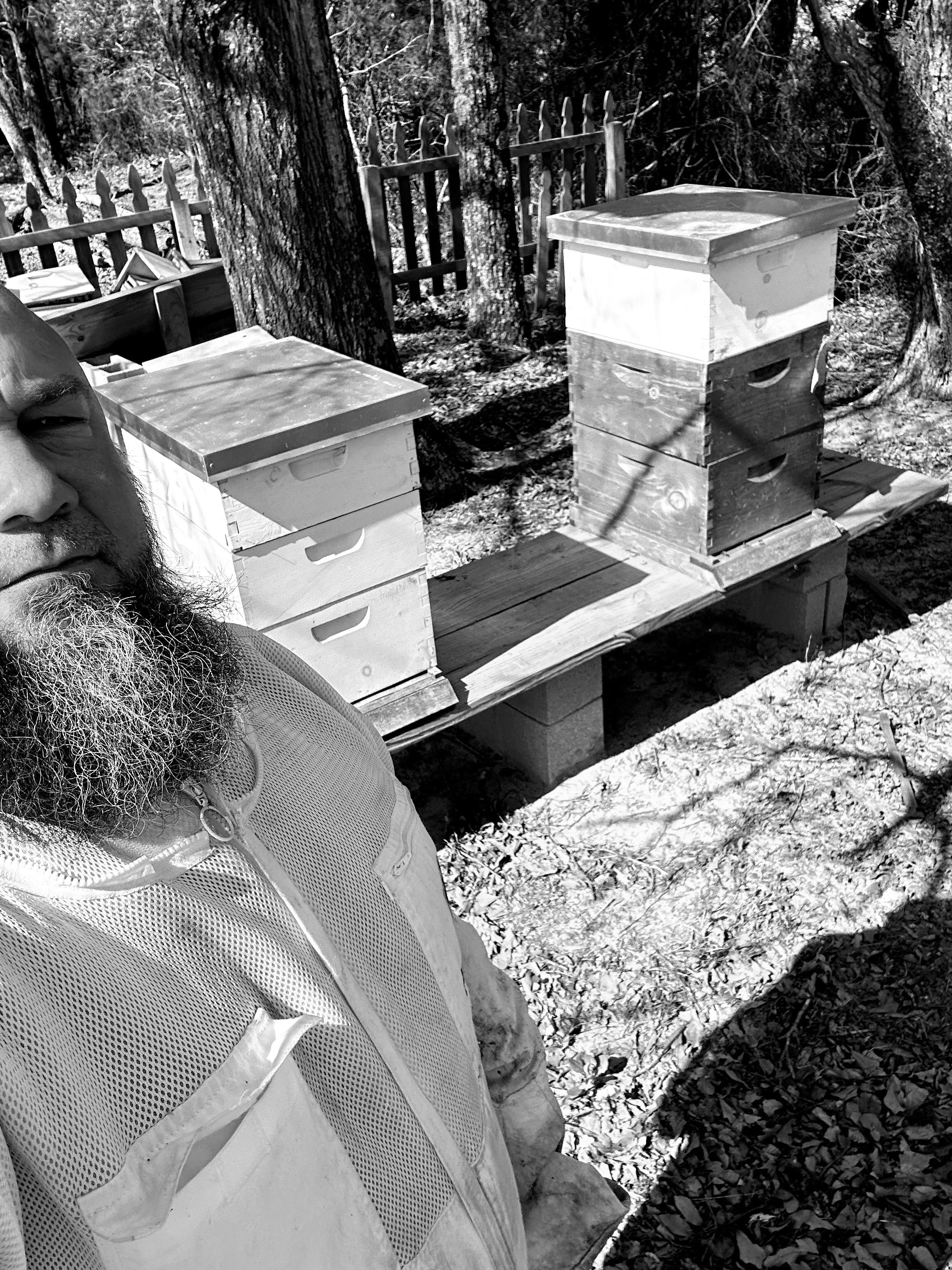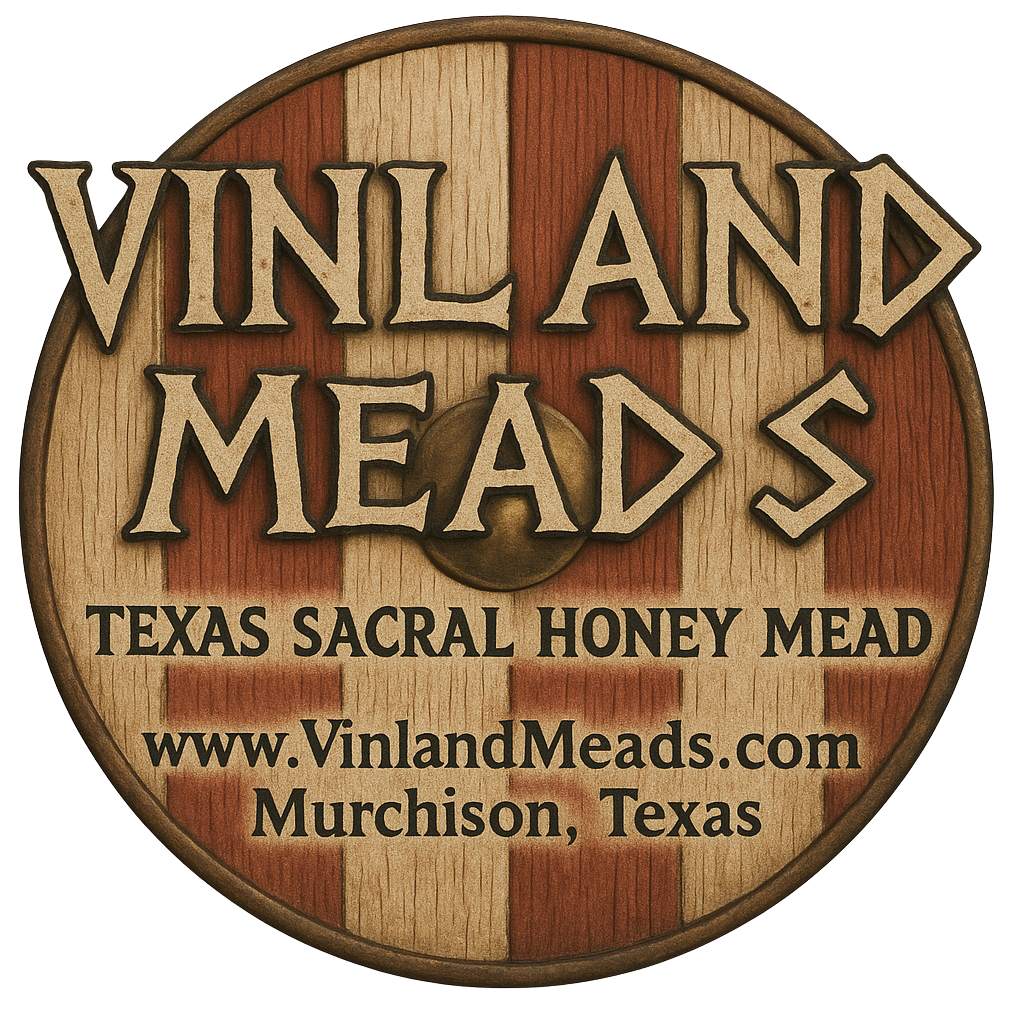Raising a Horn to the Bees
How Meaderies Like Vinland Meads Help Save the Earth
Mead Is More Than a Drink—It’s a Declaration
Its what we Believe!
“At Vinland Meads, we don’t just make mead—we make it matter.”
Our journey started, as many do, with honey. Golden, raw, wildflower honey straight from our own apiary at Hays Manor. It’s not just an ingredient to us—it’s the lifeblood of our land, a direct gift from the bees we care for and protect. Every jar of honey we sell, every bottle of mead we brew, is part of a bigger mission: to ensure that bees survive and thrive—and that future generations can raise a horn to nature, just like our ancestors did.
We believe mead can save the world—and we’re not alone.
Bee Apiary at Hays Manor
The Link Between Mead and Bees: An Ancient Partnership for a Modern Problem
Mead is the oldest known alcoholic beverage, and its primary ingredient—honey—is a direct product of pollination and biodiversity. When you support a meadery, you support the bees. Full stop.
But here’s the problem: Honeybee populations have been in rapid decline due to habitat loss, pesticides, monoculture farming, and changing climates. Colony Collapse Disorder (CCD) has wiped out entire hives, threatening not just honey, but the entire agricultural system that depends on pollination.
And yet, in this grim reality, mead has become a quiet hero.
According to the American Beekeeping Federation, nearly one in three bites of food we eat depends on pollinators like bees. Without them, not only do we lose honey—we lose almonds, apples, blueberries, pumpkins, and so much more.
Clyde in the Bee Apiary
Vinland Meads: Part of the Solution, Not the Problem
Here at Vinland Meads, we’ve always believed that you can’t make good mead without taking care of the land it comes from. That’s why we:
Raise and care for our own bees on-site at Hays Manor, our family farm in East Texas.
True Sourced Texas Honey when we can not provide enough, this means walking the honey farms we use and verifying they follow the practices we do.
Harvest our own honey, which is used in our meads or bottled raw and sold directly to our community.
Avoid pesticides and practice sustainable, small-scale apiary management, prioritizing bee health over mass production.
Educate the public at farmers markets, festivals, and farm events—because once you understand the bees, you care about them.
Every drop of honey that doesn’t go into our mead bottles still plays a vital role: it keeps our local ecosystem strong, supports pollinator forage, and helps pay for the hives and care these incredible creatures need.
Bees, Biodiversity, and the Bigger Picture
Healthy bees don’t just mean more honey—they mean a healthy Earth.
Bees are keystone species, meaning that their survival is linked to the survival of countless plants, animals, and entire ecosystems. And because our bees forage on a wide variety of local wildflowers, herbs, and fruit blossoms, they help promote biodiversity and ecological resilience in Texas.
Every gallon of mead we ferment at Vinland Meads is a layered expression of this ecosystem—from the nectar sources our bees choose, to the local fruits we blend in. It’s terroir in its truest form—mead that literally tastes like the land.
And it matters. According to a study published by the USDA and University of Minnesota:
“Apiaries placed near conservation-focused lands, such as CRP fields, show bees with stronger immunity, better overwintering rates, and increased productivity.”
(USDA Bee Health Research, 2019)
We place our bees where the flowers grow wild and free—not near monoculture soy fields. It makes a difference in the hive, and in the glass.
Inspecting Hives
Craft Mead = Lower Environmental Footprint
It’s not just about the bees. Mead production also boasts one of the smallest environmental footprints in the alcohol industry:
Environmental Footprint of Mead Compared to Beer and Wine
Because mead doesn’t rely on water-intensive crops like grapes or grains, and requires no tilling, herbicides, or synthetic fertilizers, it leaves the land better than it found it. When sourced from local apiaries like ours, it’s the most sustainable drink you can raise to your lips.
Why We Do This—and Why It Matters
At Vinland Meads, we’re not just trying to bring back an ancient drink—we’re fighting for a future where bees are still buzzing, wildflowers are still blooming, and farm families like ours can still work the land in partnership with nature.
We’ve seen what the bees can do when you give them a chance. They thrive. They multiply. They dance from flower to flower, cross-pollinating beauty and life into every corner of our farm. And with every bottle of mead we cork, we know: we’re doing something that matters.
What You Can Do (Besides Drink Mead)
Save the Bee’s - DRINK MEAD
Want to help?
Buy local honey (not the imported, ultra-filtered kind).
Plant wildflowers and avoid pesticides.
Support small farms and local meaderies like ours.
Talk about the bees—spread awareness like wildflower seeds.
And yes—raise a glass or horn. Because every bottle of Vinland Meads tells a story of sustainability, heritage, and hope. It’s a story worth sipping.
Wyatt getting the Smokers Ready
Final Thoughts: Mead as Stewardship
We’re proud to be mead makers, but more than that—we’re bee keepers. Land stewards. Storytellers.
Mead is more than a toast to the past. It’s a promise to the future.
So next time you open a bottle of Vinland Meads, know that you're not just enjoying a craft drink—you’re helping save the bees, the land, and a way of life that respects both.
“Because at the end of the day, we don’t just make mead. We keep culture alive. We keep bees alive. And that’s something worth drinking to.”
Vinland Meads Shield








